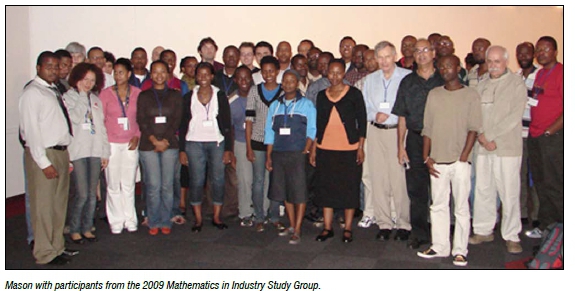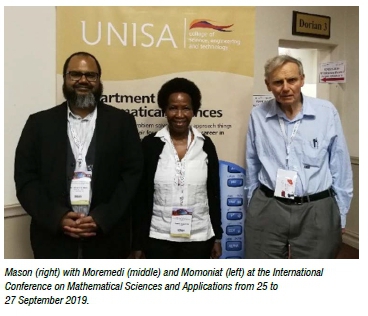Services on Demand
Article
Indicators
Related links
-
 Cited by Google
Cited by Google -
 Similars in Google
Similars in Google
Share
South African Journal of Science
On-line version ISSN 1996-7489
Print version ISSN 0038-2353
S. Afr. j. sci. vol.117 n.1-2 Pretoria Jan./Feb. 2021
http://dx.doi.org/10.17159/sajs.2021/9114
PROFILE
Professor D.P. Mason (MASSAF, FRSSAF) on the occasion of his 75th birthday: A lifetime contribution to the development of Applied Mathematics in South Africa
Ebrahim MomoniafI; Marcia MoremediII; Fazal M. MahomedIII
IDepartment of Mathematics and Applied Mathematics, University of Johannesburg, Johannesburg, South Africa
IIDepartment of Mathematical Sciences, University of South Africa, Pretoria, South Africa
IIIDSI-NRF Centre of Excellence in Mathematical and Statistical Sciences, School of Computer Science and Applied Mathematics, University of the Witwatersrand, Johannesburg, South Africa
Keywords: continuum mechanics, Mathematics in Industry Study Group
David Paul Mason turned 75 in 2019. We mark this occasion by acknowledging the contribution made by him to the development of Applied Mathematics in South Africa.
Mason completed his BSc Honours Degree First Class (Mathematics and Physics) at the University of Glasgow in 1966. He went on to complete a DPhil Degree at Oxford University in 1970 on Hilbert boundary value problems in the kinetic theory of ionised gases (plasmas) under the supervision of David Spence. He joined the University of the Witwatersrand in 1970 as a Lecturer in the Department of Applied Mathematics and Computer Science. He was promoted through the academic ranks up to the position of Ad Hominem Chair of Theoretical Mechanics in July 1986. Mason then took up the Chair of Applied Mathematics in 1991 and retired from that position in 2009. He served as Head of the Department of Applied Mathematics for the period 1988-1990 and of the Department of Computational and Applied Mathematics for the period 1997-2000. He is now an Emeritus Research Professor in the School of Computer Science and Applied Mathematics at the University of the Witwatersrand.
Mason has published over 100 articles in Web of Science journals and has supervised or co-supervised 24 MSc and 12 PhD students to completion. He continues to supervise or co-supervise students.
In 1998, he was elected as a Fellow of the Royal Society of South Africa. Two years later he was awarded a South African Mathematical Society Gold Medal for excellence in research. He received the Vice-Chancellor's Academic Citizenship Individual Award from the University of the Witwatersrand in 2013, and a year later was honoured by the South African Mathematical Society for the Advancement of Mathematics. He was elected a Member of the Academy of Science of South Africa in 2015.
He has organised the annual Mathematics in Industry Study Group meetings since 2004. They are held either at the University of the Witwatersrand or the African Institute for Mathematical Sciences in Cape Town. The Study Group meetings bring together problems from industry and problem-solving skills from universities. Industrial mathematics experts from overseas universities are invited to the Study Group to work collaboratively with South African applied mathematicians and graduate students to develop innovative solutions to the problems posed by industry. Typically, five or six problems are posed each year; since 2004, over 80 new problems of industrial origin have been brought into the mathematical sciences in South Africa. These meetings are unique in that academics - and graduate students - can publish their findings not long after the meeting. The most significant result of these Study Groups has been the number of tangible outputs through research articles, postgraduate students and the publication of conference proceedings.

Mason makes innovative use of applied mathematics as a medium for transformation and human capacity development through his postgraduate student supervision. He also contributes to the development of innovation in problem-solving in the discipline of applied mathematics in universities across South Africa through the Graduate Modelling Camp which is held the week before the Mathematics in Industry Study Group meeting. The Graduate Modelling Camp aims to prepare the graduate students for the Study Group. The graduate students, who are from the universities participating in the Study Group, learn problem-solving skills and skills in scientific communication and leadership by working in small groups on problems from earlier Study Group meetings.
Mason works closely with his higher degree students and jointly authors research articles with them, which has positively impacted on generating well-qualified academic staff. A list of Mason's MSc and PhD graduates who work in academia is given in the table. These past students who are now pursuing academic careers are based at universities across South Africa with a few teaching internationally. Other higher degree students, such as Nicolette Roussos (PhD 2001) and Charlemagne Pooe (MSc 1988) spent time in academia but are now employed in financial institutions and consultancies, where their problem-solving skills are highly valued.

Mason's research area is continuum mechanics. He regards the mechanics of continuous media as a unified discipline with different materials, such as fluids and elastic solids, satisfying the same balance laws for mass, momentum, angular momentum and energy, but with each material having its own constitutive equation. In fluid mechanics, he has contributed to boundary layer theory, thin fluid film theory, slow viscous flow and turbulent shear flows. In solid mechanics, he has applied infinitesimal elasticity to cylindrical excavations in mines, and he has contributed to non-linear oscillations in finite elasticity. He also has contributed to the interaction of fluids with solids, in porous elastic media and in hydraulic fracturing.
He contributed to the formation by Professor Fazal Mahomed of the Centre for Differential Equations, Continuum Mechanics and Applications at the University of the Witwatersrand. This research group was highly regarded both locally and internationally. Through the Centre, the powerful methods of Lie group analysis and conservation laws for differential equations were applied to problems in continuum mechanics. Together with his graduate students, Mason investigated the construction of conservation laws for both Prandtl's boundary layer equations and wake flows behind obstacles.
Mason has made a significant contribution to applied mathematics at the University of the Witwatersrand over five decades. He is one of the main reasons that research in continuum mechanics and applied mathematics has thrived and attracts many young researchers. He is an inspiration for many senior academics. His links to international institutions are key in international researchers visiting South Africa. He has made - and continues to make - a significant contribution to human capacity development in the discipline of Applied Mathematics. He continues to develop and innovate in problem-solving in the discipline of Applied Mathematics.
In honour of Mason's 75th birthday, a special session on fluid dynamics was held at the International Conference on Mathematical Sciences and Applications in 2019.

 Correspondence:
Correspondence:
Ebrahim Momoniat
Email: emomoniat@uj.ac.za
Published: 29 January 2021














